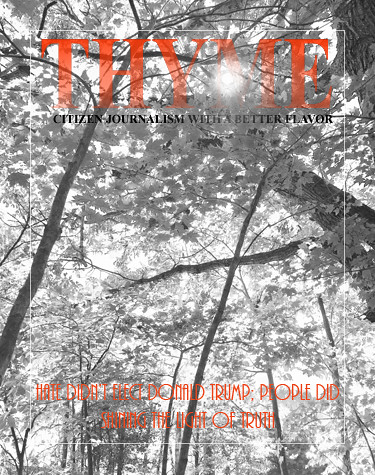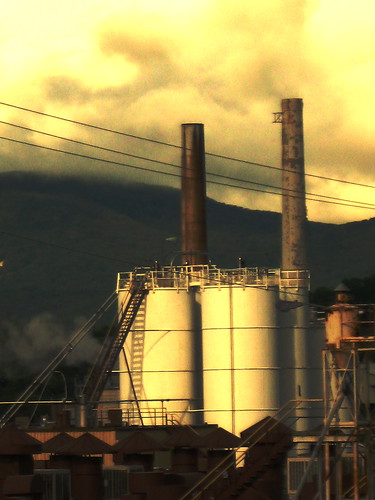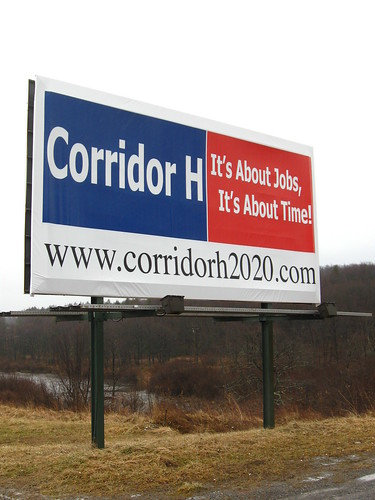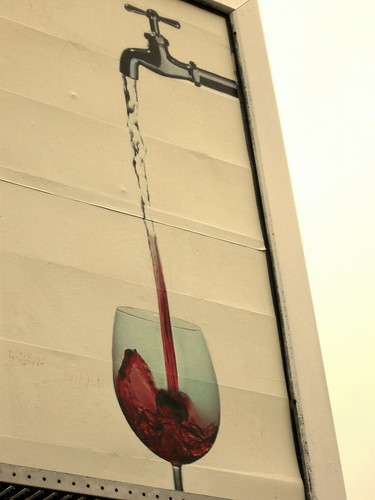
SPECIAL REPORT: Hate Didn't Elect Donald Trump

Factory stacks in Waynesboro, Virginia. Photo by Bob Kirchman.
Something to Think About
[click to read]
Hate Didn’t Elect Donald Trump; People Did
By Victoria Sanders
Over the summer, my little sister had a soccer tournament at Bloomsburg University, located in central Pennsylvania. The drive there was about three hours and many of the towns we drove through shocked me. The conditions of these towns were terrible. Houses were falling apart. Bars and restaurants were boarded up. Scrap metal was thrown across front lawns. White, plastic lawn chairs were out on the drooping front porches. There were no malls. No outlets. Most of these small towns did not have a Walmart, only a dollar store and a few run down thrift stores. In almost every town, there was an abandoned factory.
My father, who was driving the car, turned to me and pointed out a Trump sign stuck in a front yard, surrounded by weeds and dead grass. “This is Trump country, Tori,” He said. “These people are desperate, trapped for life in these small towns with no escape. These people are the ones voting for Trump.”
My father understood Trump’s key to success, even though it would leave the media and half of America baffled and terrified on November 9th.
My father understood Trump’s key to success, even though it would leave the media and half of America baffled and terrified on November 9th. Trump’s presidency has sparked nationwide outrage, disbelief and fear.
And, while I commend the passion many of my fellow millennials feels towards minorities and the fervency they oppose the rhetoric they find dangerous, I do find many of their fears unfounded. I don’t find their fears unfounded because I negate the potency of racism. Or the potency of oppression. Or the potency of hate.
I find these fears unfounded because these people groups have an army fighting for them. This army is full of celebrities, politicians, billionaires, students, journalists and passionate activists. Trust me, minorities will be fine with an army like this defending them.
And, I would argue, that these minorities aren’t the only ones who need our help. The results of Tuesday night did not expose a red shout of racism but a red shout for help.
Journalists are now reporting that Trump won because rural America voted for him in droves. I see a lot of journalists reporting about the what, the who, and the how of this election, but not many are tackling the why. I do not at all feel qualified enough to discuss the why of this, but I don’t see anybody bringing up the astounding poverty found in rural America and that the desperation found in these areas is what prompted the rise of Donald Trump. Perhaps this will inspire more intelligent people than I to look into this more deeply.
It’s easy to point to these small, impoverished towns and name racism, the second amendment or plain stupidity as the only reasons why these people would ever vote for a man like Donald Trump. I find this to be highly intellectually dishonest, though. To write this off as simple racism is to ignore the very real and very heartbreaking struggles small town America faces.
The majority of rhetoric going around says that if you’re white, you have an inherent advantage in life. I would argue that, at least for the members of these small impoverished communities, their whiteness only harms them as it keeps their immense struggles out of the public eye.
Rural Americans suffer from a poverty rate that is 3 points higher than the poverty rate found in urban America. In Southern regions, like Appalachia, the poverty rate jumps to 8 points higher than those found in cities. One fifth of the children living in poverty live rural areas. The children in this “forgotten fifth” are more likely to live in extreme poverty and live in poverty longer than their urban counterparts. 57% of these children are white.
Education, particularly college, is less attainable to those living in rural areas. 64% of young people in rural areas attend college, compared to the 70% of students who attend universities in metro areas. 47% of these small town students who end up attending college only go for a two-year degree, while only 38% of urban students attain only a two-year degree. And, when these students do fight the odds and attend a university, they don’t come back to their place of origin due to the lack of jobs.
Rural Americans also suffer from a lower life expectancy. Those living in Appalachia regions, in particular, have a life expectancy that is declining at a rate that is worse than anywhere else in the USA. Those living in rural America are more likely to suffer from depression. Alcohol and substance abuse is prevalent in rural America and 25.9% of those entering rehab for addictions are between the ages of 12-17. The chronic pain that comes from vocations such as mining has caused the heroin epidemic sweeping small towns. (read more)

Corridor H, U. S. 48 through the mountains of West Virginia, promises to bring commerce and jobs to the region. Photo by Bob Kirchman.

A billboard between the towns of Thomas and Davis in West Virginia asks: "Got Faith?" Photo by Bob Kirchman.
Staring into the Abyss
[read more]
By Father Ed Meeks
Read Transcript HERE [click to read]
I mentioned to you for the past two Sundays that I’m going to be speaking today on the November third election and want to give you a little heads-up as I begin. I will be going a little bit long this morning because I have a lot of ground to cover. This will be for me personally the 14th presidential election I will have voted in since reaching the age of majority. And this one is unlike anything I have ever seen. I actually said the same thing about the last election in 2016, but the events of the last four years and in fact of the past six or seven months have cast this upcoming election in a whole new and ever more dire light. I believe that at this moment in time and history you and I find ourselves as part of a society that is staring into the abyss. And it how our nation votes on November the third will determine whether we collectively step off the cliff into that abyss or step back from it, if only temporarily. (read more)
